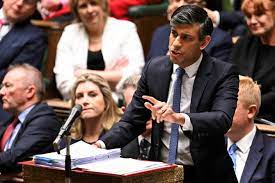LONDON: The UK government on Thursday issued a new, “more precise” definition of extremism in response to increased threats since the October 2023 Hamas terror attacks in Israel and to protect liberal democratic principles against extreme right-wing and Islamist extremists.
Extremism in the UK is now defined as the promotion or advancement of an ideology based on violence, hatred or intolerance, that aims to negate or destroy the fundamental rights and freedoms of others; undermine, overturn or replace the UK’s system of liberal parliamentary democracy and democratic rights; or intentionally create a permissive environment for others to achieve the results in the first two categories.
The previous definition, introduced in 2011 under the government’s Prevent strategy, defined extremism as “vocal or active opposition to fundamental British values, including democracy, the rule of law, individual liberty and mutual respect and tolerance of different faiths and belief”.
UK Levelling Up and Communities Secretary Michael Gove said the update was needed to safeguard the UK as a multi-national, multi-ethnic, multi-faith democracy “success story”, which is stronger because of its diversity.
“But our democracy and our values of inclusivity and tolerance are under challenge from extremists. In order to protect our democratic values, it is important both to reinforce what we have in common and to be clear and precise in identifying the dangers posed by extremism,” said Gove.
The minister said the new measures would ensure that the government does not inadvertently provide a platform to those setting out to subvert democracy and deny other people’s fundamental rights. He also indicated it marks the first in a series of measures to tackle extremism and protect British democracy. The new definition is not statutory, does not create new powers and has no effect on the existing criminal law of the country.
It will be used by ministerial departments and officials alongside a set of engagement principles to ensure they are not “inadvertently” funding or legitimising groups or individuals who attempt to advance extremist ideologies.


